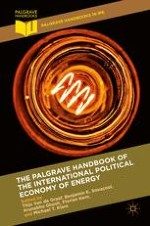This Handbook is the first volume to analyse the International Political Economy, the who-gets-what-when-and-how, of global energy. Divided into five sections, it features 28 contributions that deal with energy institutions, trade, transitions, conflict and justice. The chapters span a wide range of energy technologies and markets - including oil and gas, biofuels, carbon capture and storage, nuclear, and electricity - and it cuts across the domestic-international divide. Long-standing issues in the IPE of energy such as the role of OPEC and the ‘resource curse’ are combined with emerging issues such as fossil fuel subsidies and carbon markets. IPE perspectives are interwoven with insights from studies on governance, transitions, security, and political ecology. The Handbook serves as a potent reminder that energy systems are as inherently political and economic as they are technical or technological, and demonstrates that the field of IPE has much to offer to studies of the changing world of energy.
